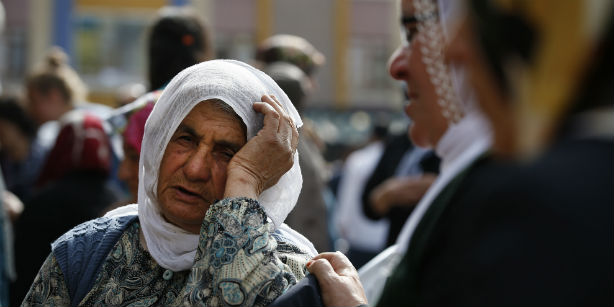In response to Saturday’s suicide bombings in Ankara,
President Recep Tayyip Erdogan asked all of Turkey to unite in opposition to
such acts of terrorism.
 |
| Turkey: Attacked, but not silent. [Source: AP/Emrah Gürel] |
It’s a strange request given that Turkey’s government also
went to great lengths to prohibit national conversation about the event.
Immediately following the attacks, the Turkish Supreme Board
of Radio and Television (RTUK) banned broadcasting images of the bombings,
claiming that such pictures would create panic. And rather than run the risk of the ban being ignored, the government also took measures to limit access to
social media sites such as Facebook and Twitter. Expert Füsun Sarp Nebil explained
to BGN News that Turkey’s Telecommunications Directorate had likely convinced
internet service providers to turn down the internet ‘tap’ as a way of
preventing open conversation about the bombings:
“To put it plainly, those in control of the tap are turning it down. After all there is nobody who knows, or cares, or is aware of what is going on. This is a matter of ‘Net Neutrality.’ Before there were violations of net neutrality for commercial considerations, but in countries like ours it’s violated for political reasons.“Think of the internet like a faucet, but instead of turning it off they simply reduce it. For example they’ll take an address that can normally be visited by 100,000 people at once and limit its access to a thousand people, meaning they’re narrowing the bandwidth. For anyone who comes to the site after the 1,000th visitor, it slows down to a trickle. Thus the user gets frustrated and eventually gives up trying to access the site.”
Such prohibition of national dialogue makes it hard to
believe that unity is really what Erdogan is after. The president has blamed ISIS for the attacks, but the Minister of Forestry and Water Veysel Eroglu is blaming
the peace rally for provoking such a bombing and those in attendance
are pointing fingers at the government itself:
Selahattin Demirtas, co-chair of the HDP party—a rally
organizer—responded: “This attack is not targeting our state and national
unity, it is perpetrated by the state against the people. We are witnessing a
massacre here. A cruel and barbarian attack was carried out. The death toll is
high.” In fact, organizer estimates of the death toll are higher than official government
numbers: 130 versus approximately 100.
In a situation with little certainty, two facts do hold
true, however:
Turkey’s November 1 elections will happen amidst a heightened climate of unrest.Turkish citizens will use what resources are available to them to continue much needed conversations online. Many citizens turned to VPNs to access Facebook and Twitter when it was otherwise all but impossible on Sunday, a good reminder that today's world simply will not tolerate mandated silence.
Turkey is currently fighting to find a united message regarding Saturday's bombing; hopefully it's not too much to ask that November's election provides a place to express it.
SumRando Cybersecurity is a South Africa-based VPN, Web Proxy and Secure Messenger provider. Surf secure and stay Rando!

No comments:
Post a Comment